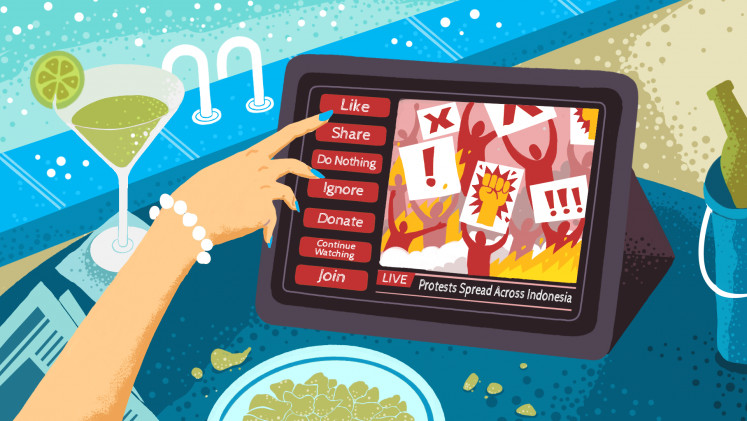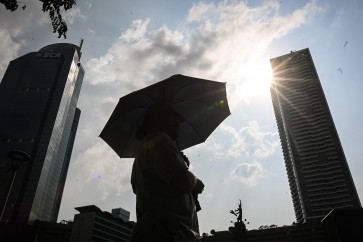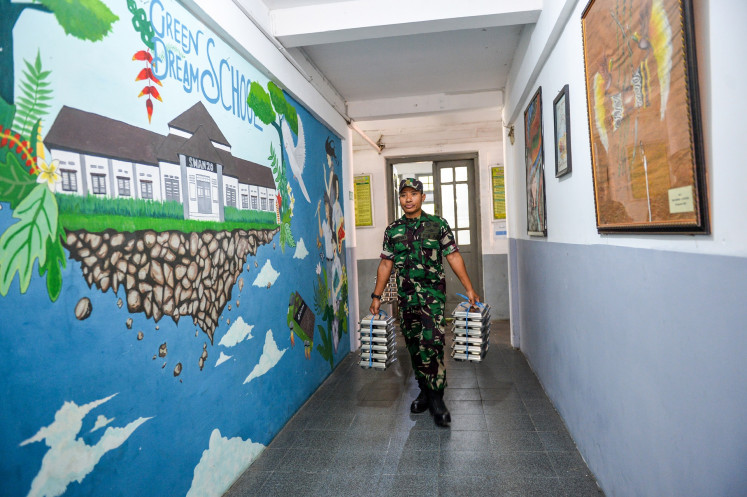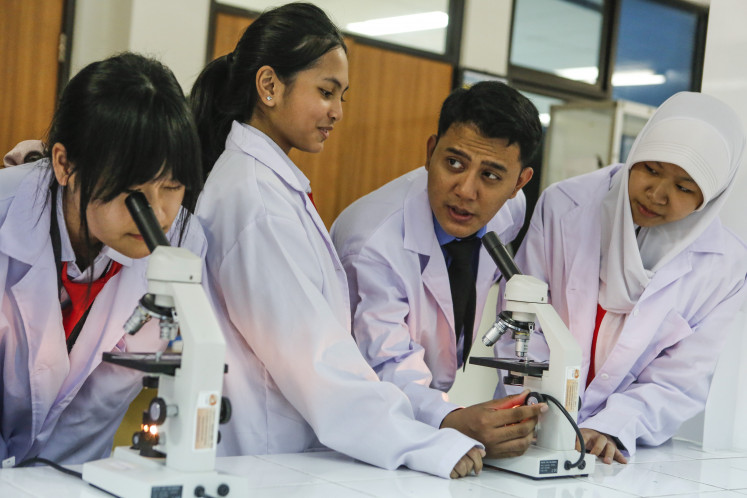Popular Reads
Top Results
Can't find what you're looking for?
View all search resultsPopular Reads
Top Results
Can't find what you're looking for?
View all search resultsLocal comics Making their own market
High-tech: An artist uses software to digitally color scanned comic panel at Stellar Labs, an affiliate of online publisher makko
Change text size
Gift Premium Articles
to Anyone
High-tech: An artist uses software to digitally color scanned comic panel at Stellar Labs, an affiliate of online publisher makko.co.
Finding Indonesian comics in local book stores is not as easy as finding Japanese manga or US superhero comics ' a situation that some artists are looking to change.
Local publishers have again started publishing local comic books, and local artists have also developed their own ways to distribute their works.
One notable success in the local scene, according to Beng Rahadian, a local artist and a founder of the comics community Akademi Samali, were Benny Rachmadi and Muhammad 'Mice' Misrad, who wrote a long-standing strip in Kompas daily. After four years of cartooning for the newspaper, the pair, better known as Benny and Mice, published a compilation of their comics in 2007. People rushed to buy the book.
Around 35,000 copies of each of the pair's seven books have since been printed, Beng said. 'That's a good example that shows that nowadays, we can make a living from making comics.'
Talented local cartoonists today have the luxury of working for international comic publishers or working locally ' something that was not possible for illustrators in the past, he said. 'Lots of our talents are working for international publishers, and they get good rewards from it. Those who work locally receive lots of orders from companies or
institutions for their projects.'
However, professional cartoonists still face an uphill struggle. 'Their position in comic industry is very important but honestly, they're still facing difficulties when it comes to financial issues,' Beng said.
Traditional: An artist sketches things the old-fashioned way, with pencil and paper.
Another comic maker, Djoko Santiko, who uses Sunny Gho as his pen name, said that an archaic payment system coupled with a limited audience made it hard for local comics to survive.
Sunny said that an artist might be paid a 50 percent advance on a book, with the remainder to be paid over six months only if the book sold out. 'That's too long. Many comic makers can't make a living that way.'
The condition prompted Sunny, who has also drawn titles for Marvel and DC Comics in the US, to set up an online publishing company, makko.co, to pay local artists by the page, just as is done in Japan and the US.
Sunny said he paid Rp 100,000 (US$10.20) a page for comics published on his website. 'It's not much, but if the artists submit their works frequently, the payment can be good.'
Twelve titles comics with themes ranging from teen life to sports to comedy have been published on makko.co since its inception in 2009.
Sunny said that the potential market for Indonesian comics might number as many as 1 million ' an ample market for makko.co.
'People are also used to reading online comics for free. I want people to also read the comics on makko so they can appreciate local talents.'
He said there were 19,000 members of makko, half of whom were active readers. 'The numbers are quite good, because the buyers of local comic books range between 3,000 and 5,000.'
Sunny said that he would publish printed versions of the online comic in the near future, uploading the latest edition of the books after they were released.
The limited availability of local comics in bookstores has also been a problem facing local comics.
Locally made: Several local comic books, including the adaptation of local soccer film Hari Ini Pasti Menang, are currently on sale.
'We only see around four or five new comic books released every month. That's quite good. But it would be better if we had at least 15 titles from various genres available in bookstores. That way, people could see and realize that local comics exist,' he said.
The history of comics in Indonesia dates back to 1931, when Kho Wan Gie, known as Sopoiku, published a comedy comic strip, Put On, in the Chinese newspaper Sin Po daily. Many other comic strips have been published in local
newspapers since.
In the early 1950s, many comic books about local heroes and superheroes were published, most famously the female superhero Sri Asih, created by the late RA Kosasih.
The glory of local comics continued until the end of 1980s, when comics were supplanted by television and movies.
'In 1995, a group of comic enthusiasts from ITB [Bandung Institute of Technology] tried to revive local comics, which was followed by college students from Jogja and IKJ [Jakarta Arts Institute], who published comics independently,' Beng said.
However, their attempts stumbled amid a market flooded with manga.
In 2003, publishing giant Gramedia established a subsidiary for local comics, Koloni, which lasted only for a year. However, it was relaunched in 2009
'The era when we were flooded with manga produced many new talents who were influenced by it. And that's fine, because our old comic artists were also influenced by western comics,' Beng said.
One of the new talents influenced by manga is Faza Meonk, a 21-year-old who is known for his character, Si Juki.
Faza said that he had developed a social media campaign before he launched Si Juki dan Petualangan Lulus UN (Si Juki and His Adventure after Passing the National Exam) in 2012.
'At first, Si Juki was only a supporting character in my comics. But many people liked hime, so we decided to make separate story for Si Juki,' he said.
So far, the book has gone through two print runs of about 6,000. Its Facebook fan page has 85,000 members while its Twitter account has 15,000 followers.
'I think comic artists today have easier access to distribute their works, thanks to social media,' Faza said.
Ardiatma Mardhika, the manager of Koloni, said that social marketing was essential.
'We want comic makers who already have fan page. We know that it's not easy selling local comics here, so if the artists have it together, we expect at least 10 percent of their followers or members to buy their comics,' he said.
Koloni now has a total of 60 titles and publishes new books at least once every other month.
'That's still small. But we're trying to look for comics whose stories can only be found in Indonesia so people want to buy them,' he said.
- Photos by JP/Novia D. Rulistia













